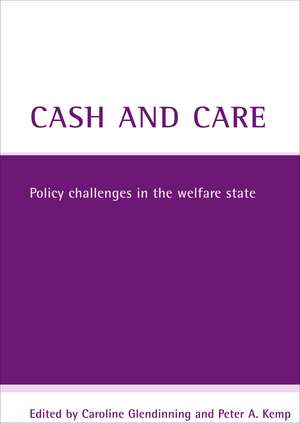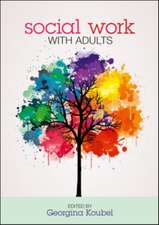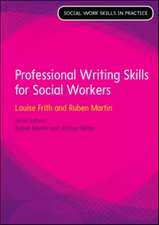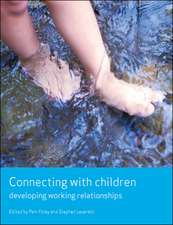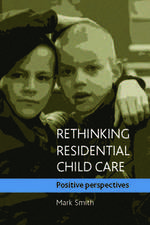Cash and Care: Policy Challenges in the Welfare State
Editat de Caroline Glendinning Autor Peter A. Kempen Limba Engleză Paperback – 24 sep 2006
Preț: 364.39 lei
Preț vechi: 383.58 lei
-5% Nou
Puncte Express: 547
Preț estimativ în valută:
69.75€ • 75.79$ • 58.63£
69.75€ • 75.79$ • 58.63£
Carte tipărită la comandă
Livrare economică 21 aprilie-05 mai
Preluare comenzi: 021 569.72.76
Specificații
ISBN-13: 9781861348562
ISBN-10: 1861348568
Pagini: 336
Dimensiuni: 152 x 229 x 20 mm
Greutate: 0.5 kg
Editura: Bristol University Press
Colecția Policy Press
ISBN-10: 1861348568
Pagini: 336
Dimensiuni: 152 x 229 x 20 mm
Greutate: 0.5 kg
Editura: Bristol University Press
Colecția Policy Press
Cuprins
List of figures and tables
Foreword
Acknowledgements
Notes on contributors
Part One: Introduction
1. Introduction
Peter A. Kamp and Caroline Glendinning
Part Two: New theoretical perspectives on care and policy
2. Care and gender: have the arguments for recognising care work now been won?
Jane Lewis
3. Research on care: what impact on policy and planning?
Kari Wærness
4. 'Pseudo-democracy and spurious precision': Knowledge dilemmas in the new welfare state
Eithne McLaughlin
Part Three: Traditional forms of disadvantage: new perspectives
5. The costs of caring for a disabled child
Jan Pahl
6. Disability, poverty and living standards: reviewing Australian evidence and policies
Peter Saunders
7. Consumers without money: consumption patterns and citizenship among low-income families in Scandinavian welfare societies
Pernille Hohnen
8. Affordable credit for low-income households
Sharon Collard
9. Carers and employment in a work-focused welfare state
Hilary Arksey and Peter A. Kemp
Part Four: Families, care work and the state
10. Paying family caregivers: evaluating different models
Caroline Glendinning
11. Developments in Austrian care arrangements: women between free choice and informal care
Margareta Kreimer
12. When informal care becomes a paid job: the case of Personal Assistance Budgets in Flanders
Jef Breda, David Schoenmaekers, Caroline Van Landeghem, Dries Claessens and Joanna Geerts
13. Better off in work? Work, security and welfare for lone mothers
Jane Millar
14. Reciprocity, lone parents and state subsidy for informal childcare
Christine Skinner and Naomi Finch
15. Helping out at home: children's contributions to sustaining work and care in lone-mother families
Tess Ridge
Part Five: From welfare subjects to active citizens
16. Making connections: supporting new forms of engagement by marginalised groups
Karen Postle and Peter Beresford
17. Independent living: the role of the disability movement in the development of government policy
Jenny Morris
18. Securing the dignity and quality of life of older citizens
Hilary Land
Part Six: Conclusions
19. Conclusions
Caroline Glendinning and Peter A. Kemp
References
Index
Foreword
Acknowledgements
Notes on contributors
Part One: Introduction
1. Introduction
Peter A. Kamp and Caroline Glendinning
Part Two: New theoretical perspectives on care and policy
2. Care and gender: have the arguments for recognising care work now been won?
Jane Lewis
3. Research on care: what impact on policy and planning?
Kari Wærness
4. 'Pseudo-democracy and spurious precision': Knowledge dilemmas in the new welfare state
Eithne McLaughlin
Part Three: Traditional forms of disadvantage: new perspectives
5. The costs of caring for a disabled child
Jan Pahl
6. Disability, poverty and living standards: reviewing Australian evidence and policies
Peter Saunders
7. Consumers without money: consumption patterns and citizenship among low-income families in Scandinavian welfare societies
Pernille Hohnen
8. Affordable credit for low-income households
Sharon Collard
9. Carers and employment in a work-focused welfare state
Hilary Arksey and Peter A. Kemp
Part Four: Families, care work and the state
10. Paying family caregivers: evaluating different models
Caroline Glendinning
11. Developments in Austrian care arrangements: women between free choice and informal care
Margareta Kreimer
12. When informal care becomes a paid job: the case of Personal Assistance Budgets in Flanders
Jef Breda, David Schoenmaekers, Caroline Van Landeghem, Dries Claessens and Joanna Geerts
13. Better off in work? Work, security and welfare for lone mothers
Jane Millar
14. Reciprocity, lone parents and state subsidy for informal childcare
Christine Skinner and Naomi Finch
15. Helping out at home: children's contributions to sustaining work and care in lone-mother families
Tess Ridge
Part Five: From welfare subjects to active citizens
16. Making connections: supporting new forms of engagement by marginalised groups
Karen Postle and Peter Beresford
17. Independent living: the role of the disability movement in the development of government policy
Jenny Morris
18. Securing the dignity and quality of life of older citizens
Hilary Land
Part Six: Conclusions
19. Conclusions
Caroline Glendinning and Peter A. Kemp
References
Index
